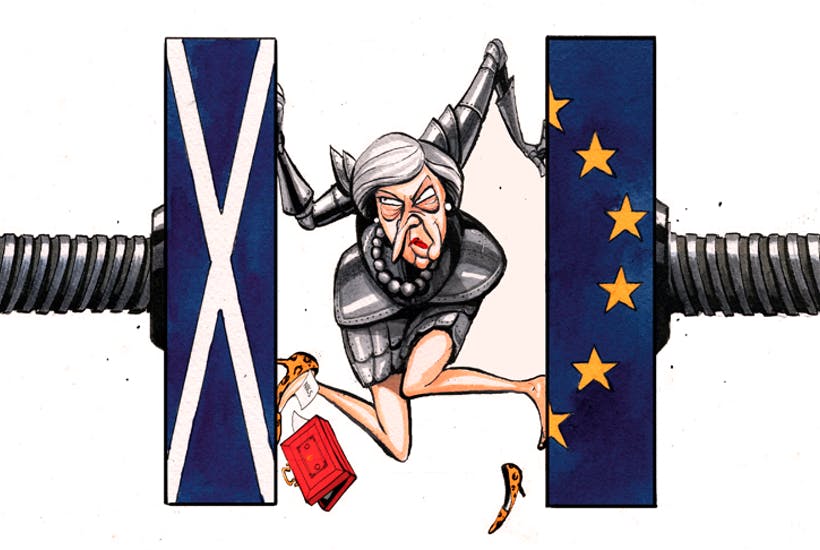It is a measure of devolution’s success that politicians, provided they are of sufficient stature, can make waves and news even though they are not members of the House of Commons. In their different ways – and with their very different destinations in mind – both Nicola Sturgeon and Ruth Davidson demonstrate as much. The United Kingdom – for such it just about remains – is better for this.
For some time now, we have been waiting for Davidson to make a Brexit intervention. This morning she obliged. Addressing yesterday’s near-fiasco on the other side of the north channel, the Scottish Tory leader released a statement demanding that:
‘If regulatory alignment in a number of specific areas is the requirement for a frictionless border, then the Prime Minister should conclude this must be on a UK-wide basis.’
No special deals for Northern Ireland and no special deals for any other part of the country either. What’s good enough for Northern Ireland should be good enough for England, Wales and Scotland too. This message was reiterated to the cabinet this morning by David Mundell, the Secretary of State for Scotland. And if that means that the UK has a closer relationship with the EU than some hardcore Brexiteers would like then so be it. The integrity of the UK is still supposed to matter to the Conservative and Unionist party even if many Scottish Tories have long been aware of the manner in which many English Tories think a clean, hard, extreme, Brexit from the European Union more important than maintaining and nurturing the Union of Great Britain and Northern Ireland. That’s their choice, of course, though it’s one many Scottish Tories think close to unforgivable.
The question on the referendum ballot paper, Davidson reminded her colleagues in London, ‘did not ask if the country should be divided by different deals for different home nations’. There might be specific aspects of the Irish situation that demand a more nuanced approach than that favoured by hardline Brexiteers, but what’s right for Northern Ireland should be right for the rest of the UK too. This is not necessarily, as many people assumed yesterday, Northern Irish membership of the single market or customs union (preferable though that might be). Still, Unionists in the cabinet – and there are still some to be found there, not least in the Department for environment, food and rural affairs – have a choice to make.
Theresa May is the fourth consecutive Tory prime minister whose career is going to be ended, to one degree or another, by the european question. It should be clear by now that the Brexiteer ultras can never be placated or bought off. You cannot hope to pay the Cashgeld in the hope Bill Cash will disappear. You end by running out of political capital and Bill Cash and his ilk always return for more. Enough is enough, say the moderates.
The foolishness of ‘no deal is better than a bad deal’ proves as much, even though it had previously been agreed – at least by sensible folk – that no deal would be a terrible thing. A terrible thing has been redefined as something better than something that is merely sub-optimal. Indeed, no deal appears to be what the monomaniacal sovereignties would actually prefer.
Davidson’s intervention matters, then, because it is a warning to the Prime Minister that she is expected to keep her promises and that includes promises made to people who did not vote for Brexit. Davidson accepts that Brexit must happen and while she would prefer, all things being equal or possible, to remain in the single market she accepts that ship has sunk.
But when it comes to regulatory alignment, the Scottish Tories point to the Prime Minister’s speech in Florence. There, May reiterated an important but too often ignored truth:
‘We do not start with a blank sheet of paper… We have the same rules and regulations as the EU – and our EU withdrawal Bill will ensure they are carried over into our domestic law at the moment we leave the EU.’
Not only that but:
‘We share a commitment to high regulatory standards. People in Britain do not want shoddy goods, shoddy services, a poor environment or exploitative working practices and I can never imagine them thinking those things to be acceptable.’
The ‘new economic partnership’ between the EU and the UK should be ‘comprehensive and ambitious’ and ‘underpinned by high standards and a practical approach to regulation’. Not the status quo – because differences will undoubtedly arise – but still something as close to regulatory alignment as is possible.
And, as Ruth Davidson makes clear, that has to be the case for the whole of the UK not just part of it. Brexit is multi-stranded. On the one hand, there is the symbolism of leaving the single market and the ECJ; on the other, there is the substance of the detail of future trading arrangements. Davidson, as a moderate, pragmatic, Tory is prepared to countenance giving the Brexiteers what they want on the (important) symbolism so long as the moderate, pragmatists, prevail on the substance.
The question for the Prime Minister is whether she agrees with this. And, if she does, what she is going to do about it. Because she too has to make a choice.







Comments